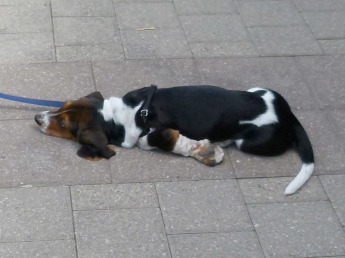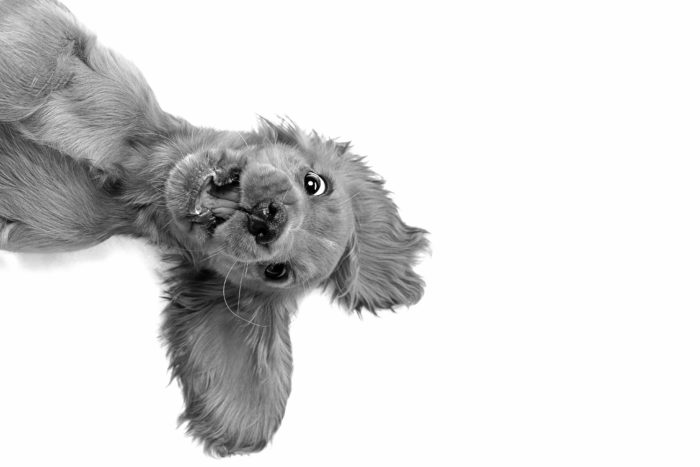Life Skills
Why Bother Starting Early?
If the first year of a dog’s life is the equivalent of 18 human years, could you imagine beginning a child’s education at 18 years old…or even at 9 years old? It is inconceivable.
 Nothing beats early ed. Life skills. It is like working on a fresh unpainted canvas. The rewards of teaching a dog while she is still a puppy last the lifetime of the dog!
Nothing beats early ed. Life skills. It is like working on a fresh unpainted canvas. The rewards of teaching a dog while she is still a puppy last the lifetime of the dog!
A dog’s life is enhanced when we take the time to teach them life skills. We are giving our dogs the skills they need in order to live with us harmoniously.
It not only enriches our lives, but it also enriches our dog’s life. Dogs were not born to just sit around and do nothing. Most were bred to do work of a specific nature (such as herding, tracking, or rescue). It is our responsibility to know what it is our dogs are born to do and to ensure that these pups have that outlet during their lifetime. Dogs appreciate a challenge. They love to work and to play games. They need to be stimulated. This is an important facet of a dog’s life that is sadly often overlooked. Teaching the basics is a vital aspect of life with your pup. It strengthens the bond, keeps the dog safe and stimulated, and is a must for all canines in rural, urban, or suburban areas.
Teach a dog while still a puppy and then maintain these basics as the dog matures and ages.
A bit of effort up front can help reduce years of stress for you and the dog.
Both the Canadian Kennel Club and the American Kennel Club have “Canine Good Citizen” certification programs that test new dogs to ensure that they can be counted on to present good manners at home, in a public place, and in the presence of other dogs. The details of these programs are outlined in Resources. This is another area of training you may enjoy accomplishing with your dog.
The most logical time to begin educating any dog is when he is still a puppy. It is an ideal time to raise the kind of dog you want to live with for the years to come.
For example, the best time to start house training your puppy and to show him where you want him to do his business is as soon as you get home, before going into the house for the first time.
Ultimate Puppy will start you off with basic skills designed specifically for dogs under the age of 16 weeks.
Traffic. Ensuring that your dog does not run across a busy street.
People. Jumping up to greet people, embarrassing when your dog has muddy paws, or it could be traumatic to a small child.
Human valuables. A dog wanting to be up on the furniture –- some people will allow this, others will not. Dogs have no sense of artifacts or things you might treasure. It is unlikely to be okay with you if your dog chews the one copy of your family photo album or destroys a valued gift.
Food and resources (toys and food) guarding. It can be problematic if a dog growls or snaps when someone needs to take an object away. They need to learn that it is not necessary to guard an object and to drop the object when asked.
The basics that you teach your puppy will become the foundation for any continued education you may wish to do with your dog.
Your puppy knew how to sit, stay still, stand, and lie down before he ever met you. What you can teach him is to do these things relatively predictably, when you ask, around distractions.
A dog that is comfortable in public places around distractions; and who is able to check in with you or settle for a bit if needed will get to be included in many activites with you. Fun for you and the dog!
It is difficult to anticipate all the circumstances you might encounter with your dog through your time together. However, there are some everyday situations that are common to the dog-human relationship which are well established. With basics in place, many real-life situations that you encounter with your dog should not create big problems.
The most obvious place to start this work is in your home. Start simple and work your way up. Move out into public areas once your pup is successful at home. (See Tracking Your Training Progress: Baby Steps to Success)
Food, fun, and games are powerful tools when developing your dog’s attention span and ability to learn how to do the things that we want them to do. We explain in detail how, why, when, and where to work with food in the How Dogs Learn section. Games can be effective in helping to focus your puppy’s attention and build specific behaviors. We have a comprehensive Games section.
Be sure to check the Equipment List to ensure that you have everything you need before you begin.
Build on success. Set your puppy up to win. Work in environments that your puppy can handle and use the right treats and toys for the job.

